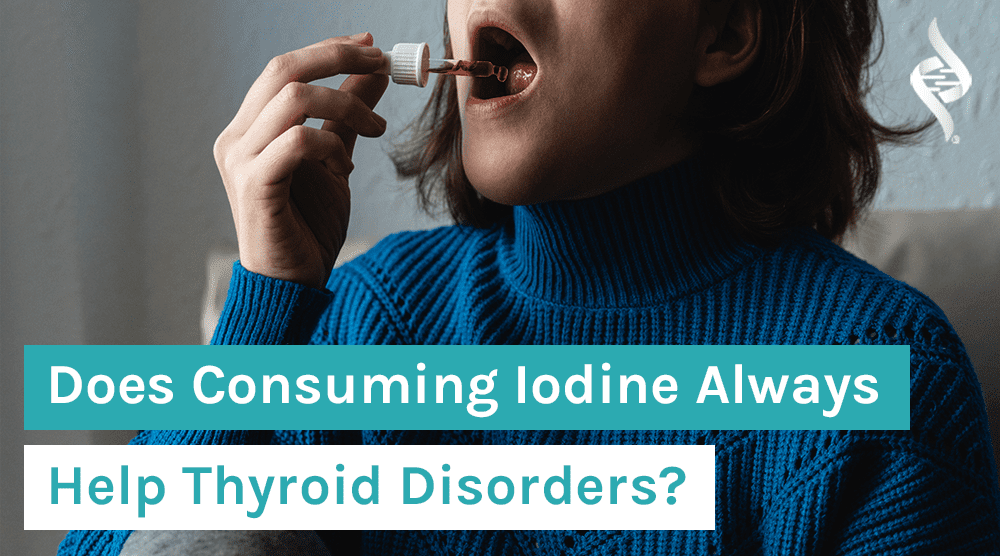Does Consuming Iodine Always Help Thyroid Disorders?
Video Transcript:
Today, we have a specific question about hypothyroidism and iodine. Today’s question is, “Everywhere I have read about how great iodine is for the thyroid. And every time I eat iodine-based foods like kelp, chlorella, and dulse, I cannot sleep afterwards. Can you please comment on that?”
Hypothyroidism, Autoimmunity & Iodine
Well, that is a fantastic question, and it is something that I really want to dig into because we here at Organixx, we have iodine, liquid iodine, and it’s a very powerful way of introducing key nutrition to support your iodine receptivity and to ultimately power up your thyroid.
But in certain cases, individuals that have existing, diagnosed hypothyroidism and/or a combination of hypothyroidism and autoimmunity – and we know that as Hashimoto’s, being a common one, these instances can plague individuals when they consume iodine-rich foods or consume an iodine supplementation.
Iodine Supplementation Should be Calibrated
So, what happens is iodine has to be a hundred percent dialed in and calibrated in a way, especially with any type of hypothyroidism, any type of diagnosis. Also, there are influences of medication here, too, so that may be an underlying component.
But essentially, we need to calibrate the right amount of iodine to get into your body, because we only have a certain amount of iodine receptivity, and sometimes a microdose versus a full-fledged dose one time a day, and kind of spacing out your dosing twice a day or three times a day may be just the incremental change to help your body assimilate and absorb iodine and utilize it in an appropriate fashion.
Thyroid Gland: Failure to Adapt
Now, there is something that we have labeled in the kind of medical world as “failure to adapt,” where the actual thyroid gland is just not capable of adapting to or receiving the iodine that your body is consuming via diet or nutritional supplementation like a liquid iodine.
Pay Attention to Side Effects
In that type of case, you might have acute effects, acute side effects, meaning you might have a lack of sleep, or you might notice kind of flushing, you might have a speedup of your heart rate, you might feel more fatigued, you can even have diarrhea.
And so, that is really critical to pay attention to the symptoms. I call it the language. Symptoms are the language of your body, because if you are consuming those foods and you are having a side effect like an imbalance in sleep patterns, then what I recommend is contacting your physician, getting retested. Let’s calibrate and see where your values are now so that if we need to make adjustments either to some medication you’re consuming or certain foods, then we can do that.
Influencers That Can Offset Iodine Receptivity
Now, the other thing that I want to highlight is not only are there medication influences, so if an individual’s taking blood pressure medicine or blood sugar or balancing medication, those can affect iodine receptivity. Your diet can affect that. If you’re eating a lot of foods that are rich in bromine, it’s an additive that we find in flours, so if you’re not going gluten-free, you might be getting too much bromine, or you might be consuming too much fluoride or fluorine in your daily lives, or chloride.
So, there’s an assortment of influencers that can offset iodine receptivity, so fine-tuning your diet, your lifestyle, even your water sources, cleaning up your water, is really critical because glandular dysfunction can lead to this “failure to adapt,” where you are trying to consume a good, healthy nutrient that we know is important for thyroid function, but your thyroid gland for whatever reason is not receiving it, and it’s not adapting to that functionality of iodine.
Magnesium Supplementation Can Enhance Iodine Receptivity
So, I hope that is helpful. The only other thing that I would recommend is to add in a magnesium blend, like a Magnesium 7. I have found that when we have a broader array of minerals, particularly in a sort of magnesium, it can help that receptivity enhance.
Thyroid Testing Can Help Ensure a Tailored Iodine Protocol
So, I hope that’s helpful. Let us know. Definitely do get into your clinician and get your thyroid tested, because the symptoms of reactivity to iodine-rich foods is definitely a sign, and if you haven’t had your TPOab (it’s a big T, big P, big O, and then a little ab) – that’s a thyroid peroxidase antibody test – that will identify if you have Hashimoto’s. In which case, iodine is not recommended unless we do certain things, and that is often where individuals like myself work one-on-one with patients to sort out, “Okay, if we’re going to have iodine, we need X, Y, and Z with it based on your specific tailored needs, based on your labs.”
So, I hope that’s helpful. Let us know how it goes, and I hope that you get to feeling better when you eat wonderful, rich iodine foods.
Organixx Iodine is a USDA Certified Organic, alcohol-free, and Certified Clean formula made with only pure nascent iodine and organic vegetable glycerin. Nascent iodine is the highly bioavailable, atomic form of iodine your body can readily absorb and use for thyroid and whole-body support.* Unlike conventional potassium iodide, which must be converted before use, nascent iodine is pre-activated for faster, more efficient utilization. Each drop is vegan, non-GMO, free from fillers and contaminants, and proudly made in the USA for uncompromising purity.*
*These statements have not been evaluated by the Food and Drug Administration. This product is not intended to diagnose, treat, cure or prevent any disease.






Tested for iodine and mine is low,
Have hashimotos and have had breast cancer twice last in 2021.
On bp meds since chemo can’t seem to get the correct dose of thyroid med to keep the bp normal.
Tried taking a small dose of iodine
And gives me caffeine like side effects
Hi there-
What is the difference between nascent iodine and ionic Iodine (from potassium iodine)? Do they perform different actions in your body? Should you take both? Is one better than another?
Thanks!
Sufferers of Graves Disease/Hyperthyroidism should not supplement with iodine.
I have been diagnosed with a rectal villous Adenoma which interferes with the absorption of nutrients eg I became deficient in potassium and now take potassium supplements. Would you have any other recommendations? Thank you Hans in Montreal Canada
I use your iodine topically right over my thyroid. Is this ok?
Or should it be better to ingest?